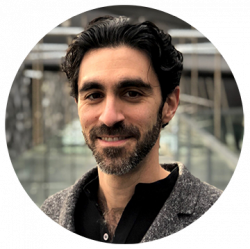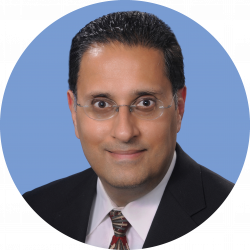Smarter Tech, Safer Care and Better Outcomes
Technology leaders will be speaking back-to-back at Quality Talks. They will share insights you’ll want to hear.
Uses and misuses of AI to improve care

Health care executives with more data than they know what to do with call Ziad Obermeyer for help.
He steers organizations away from trouble and toward success by answering questions savvy leaders know can undermine quality: How do we keep algorithms from reinforcing racial bias? What can machine learning tell us about how clinicians learn and make decisions? And how do we combine artificial intelligence and human intelligence to solve quality problems?
A former McKinsey consultant and Harvard Medical School instructor, Ziad was a top-rated presenter at NCQA’s 2021 Digital Quality Summit. He ascends to NCQA’s biggest stage, Quality Talks, with new insights into how technology can—and can’t—make care better.
Tech help for mental illness and addiction

Nishi Rawat never knew leaving the astronaut selection program to focus on her medical career would put her in the middle of three public health crises at once: mental illness, addiction and COVID.
She runs a technology platform that states and health plans use to match people who need behavioral health care with specialists who provide whole-person support.
She comes to Quality Talks to share hard lessons she’s learned during the pandemic—a time when demand for behavioral health care has soared and treatment options have shrunk.
She’s learned the right technology can improve whole-person care by bridging distinctions between physical and behavioral health care. And she knows smart treatment for mental illness and addiction includes working with law enforcement, community groups and patients’ families.
Nishi’s a creative, down-to-earth leader you’ll want to hear.
Making the most of EHRs as safety aids

If you follow best practices for EHRs, chances are you’re doing something patient safety and technology advocate Hardeep Singh explored.
Hardeep’s ahead of his time on EHRs. He co-created the Safety Assurance Factors for EHR Resilience (SAFER) Guides, which CMS made a mandatory patient protection eight years later.
Hardeep won a Presidential Early Career Award for Scientists and Engineers—a White House honor for young scientists on track to make major discoveries. Hardeep was a smart bet: He has become one of the world’s most cited and influential EHR researchers.
Hardeep’s work offers a glimpse into what most EHR users will be doing years from now. He has an encouraging message for the Quality Talks audience: EHRs offer more possibilities for protecting patient safety than you realize.
Are you as intrigued as we are?
Join us in person or online at Quality Talks on April 21 to hear these and other vivid stories about how to improve health care. Rate is going up on April 10!